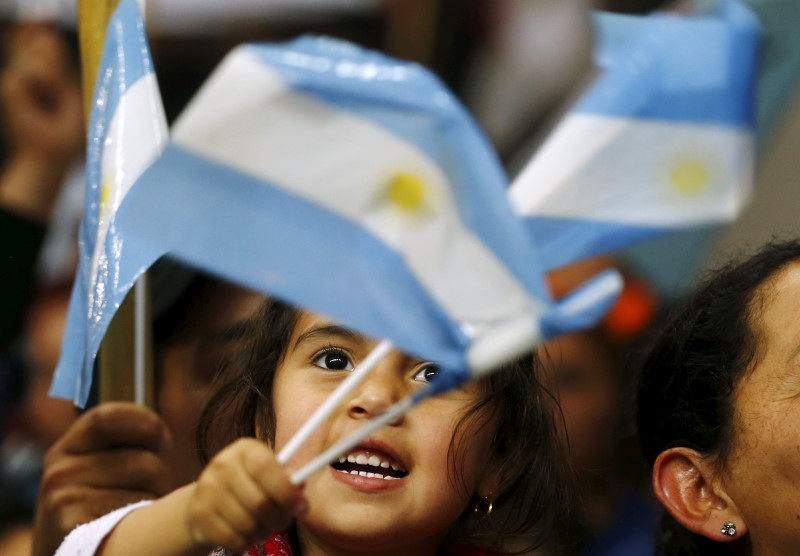(Bloomberg) -- Argentina has asked the International Monetary Fund for financing to help stem a five-month-rout in the peso that has led to a surge in interest rates and threatens to derail its economic recovery.
“This is going to allow us to strengthen our growth and development program,” President Mauricio Macri said on Tuesday in a televised address, without mentioning how large the line was.
The government is seeking a flexible credit line worth $30 billion, a person with direct knowledge of the talks said. Treasury Minister Nicolas Dujovne will head a delegation flying to Washington on Tuesday evening for talks with the Fund, the ministry said. The IMF said in a statement the talks will help strengthen Argentina’s economy "in short order."
“This will allow us to face the new global scenario and avoid a crisis like the ones we have faced before in our history," Macri said.
The speech was the first time that Macri spoke to the country after the central bank abruptly raised the benchmark interest rate three times in 10 days to 40 percent -- the highest among major economies. The currency has plunged more than 18 percent this year, dragging down assets from bonds to stocks. The peso pared earlier losses and traded at 22.75 per dollar in early afternoon trade from 21.94 yesterday.
The decision to accept an IMF credit line is the latest twist in the sometimes fraught relationship between the fund and Argentina. The IMF lent to Argentina before the country defaulted on its debts in 2001. The IMF was heavily criticized in Argentina for failing to forestall the debt crisis.
Relations with the fund have warmed in recent years. Argentina was censured by the IMF in 2013 for failing to disclose economic data, but the fund removed the censure declaration in 2016 after the government improved its transparency.
"We’re looking for preventive financing for Argentina to bring stability to the market," Nicolas Dujovne, Argentina’s Treasury Minister told reporters in Buenos Aires. “We’ve begun talks with the IMF to have a preventive line of credit, bearing in mind that the IMF has given express support to our gradual program."
Precautionary Tool
The IMF offers the flexible credit line as a precautionary tool for countries that want to reassure markets they are following economic policies approved by the Washington-based fund. Governments can draw on the lines at any time. To qualify, countries must show they have strong economic fundamentals and are implementing policies vetted by the IMF. Colombia, Mexico and Poland are the only nations to have signed up for the credit line. None of them have drawn on the lines, and Poland exited the arrangement last year.
"An IMF flexible credit line would no doubt provide some comfort," said Kevin Daly, a London-based money manager who helps oversee $14 billion in emerging-market debt at Aberdeen Asset Management. "I think you’ll see some selling into strength if there’s a rally on back of this."
Peso Rout
Earlier on Tuesday, Argentina’s peso traded at a record low tracking a rout in global emerging markets. The central bank raised rates on Friday for the third time in eight days in an unprecedented move that underscored challenges faced by President Macri as he attempts to rein in inflation and government spending.
Alberto Ramos, the head of Latin America research at Goldman Sachs Group Inc (NYSE:GS). in New York, said Argentina’s request for financing help is a positive development as it increases the central bank intervention firepower and, therefore, the ability to anchor the currency. Central bank policymakers are scheduled to meet at 4 p.m. local time to decide on rates.
(Updates with IMF details starting on third paragraph.)
